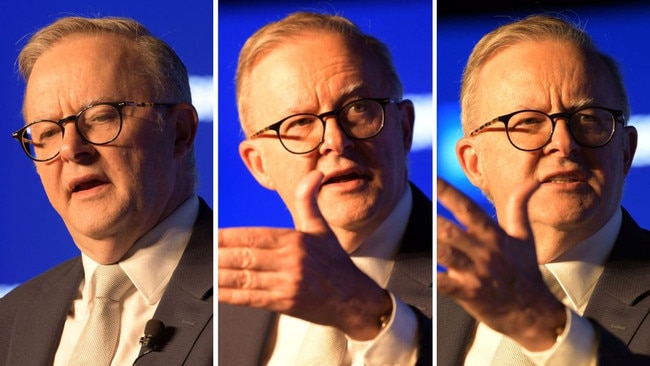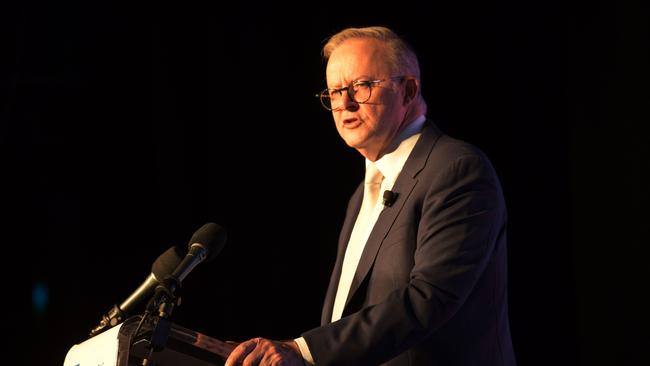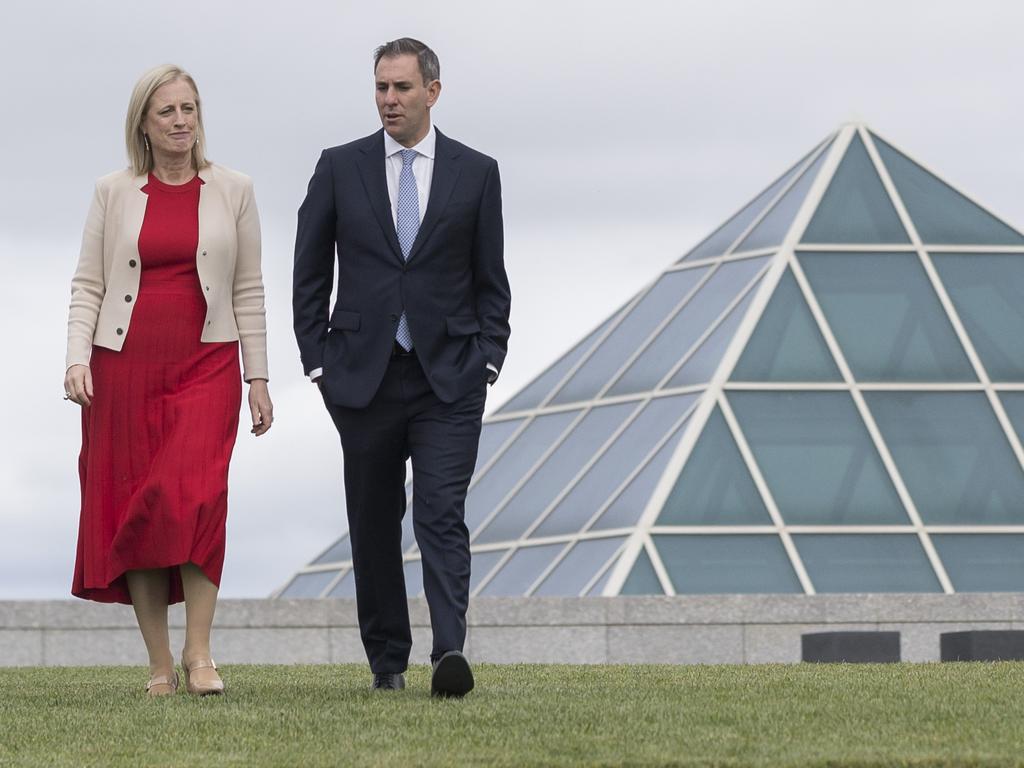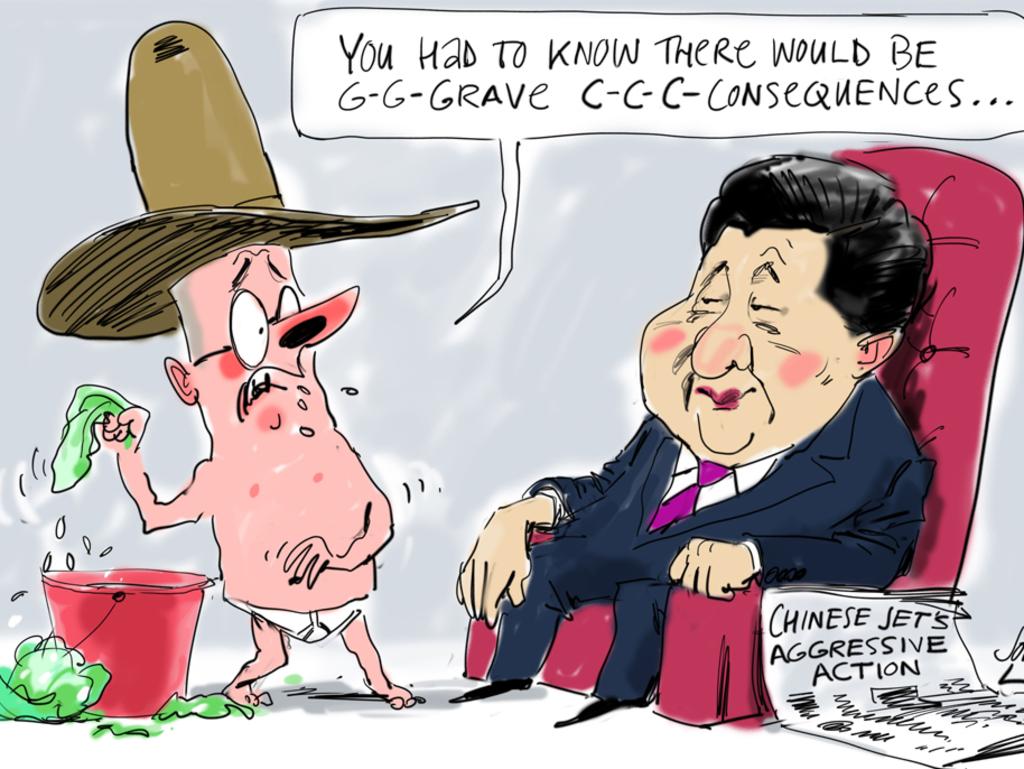What we’ve got here is a failure to communicate, PM
In opposition Albanese spoke with the clarity of a door-to-door salesman. Now that his promises have been dashed on the rocks of reality, he does not know what to say.

Forget about an absence of malice; to watch the Prime Minister’s media conferences these days is to endure a pitiful search for words and an avoidance of meaning. The less he knows about his position, the more he contemplates what he should not be saying, and the more platitudes he throws into a word salad constructed more to escape political traps than convey conviction.
“What I’d say is this,” Albanese said in Perth this week when asked about Islamist radicalisation fuelled here by events in Gaza, “the Middle East is a complex issue with history going back hundreds of years.” You don’t say.
“I think overwhelmingly Australians, some Australians will have strong views,” he continued, “and I understand that, particularly people who have relatives either in Israel or in Gaza or the West Bank will have strong views and it will be, it is a difficult time. But overwhelmingly Australians and our multicultural society do not want disputes brought here to Australia.”
Albanese then went on to congratulate the West Australian police who shot dead a radicalised teenager days earlier, acknowledged Muslim leaders, mentioned Premier Roger Cook, segued to social media and a speech he made about jobs and skills as well as one he made five years ago about social media, referred to parents on the side of kids sport, said he had to be careful what he said, noted that authorities were concerned, name-checked national cabinet, then talked about domestic violence and pornography before wrapping up.
“The promotion of misogyny, the portrayal of violent, misogynist pornographic images can really undermine harmony and can undermine what should be respectful relationships,” he concluded.
How did we end up there? I watched this interview live on TV and have read the transcript several times and I have no idea what point the Prime Minister was trying to make. He was filling time, ticking boxes and avoiding trouble. Albanese runs the risk of losing Australians as quickly as Kevin Rudd. Waffle does not cut it.
I was so struck by this failure to communicate that I decided to revisit George Orwell’s seminal 1946 essay, Politics and the English Language. “The great enemy of clear language is insincerity,” Orwell wrote. “When there is a gap between one’s real and one’s declared aims, one turns as it were instinctively to long words and exhausted idioms, like a cuttlefish spurting out ink.”
That is Albanese in a nutshell. Because he does not know what he believes or cannot say what he truly believes, he is hiding behind obscure language. It is the absence of conviction.
Albanese’s clearest political statements are the ones that turned out to be untrue. “We will see those energy prices drop by $275 by 2025,” he said, repeatedly, in the 2022 election campaign. “We will put in place mechanisms that provide cost-of-living relief,” he promised. “I’ll build people’s living standards up,” he said, pledging “a better future with real plans to address the cost of living”.

In opposition Albanese spoke with the clarity of a door-to-door salesman. Now that his promises have been dashed on the rocks of reality, he does not know what to say. “Well, we know that the market is speaking, and the market tells us that the cheapest form of new energy is renewables,” the Prime Minister told the Queensland Media Club last month. “And that’s what’s driving that change through, that’s why there’s nothing to stop people building a new coal-fired power station except reality, except the market.”
Who is he trying to convince here? And about what?
The pretence that some kind of free market operates our electricity sector, amid an array of mandates, subsidies, grants and legislated emissions goals, is ridiculous, which is why Albanese ended up sounding like he was trying to win himself over.
“So, we want to create an environment whereby we provide support, but where we acknowledge the importance of market mechanisms. And what that means is that investment in renewables will lead to cheaper power because that’s what every economist tells us, that’s what the Australian Energy Market Operator tells us as well through their integrated systems plan.”
Drivel. All contestable. All meaningless. And all giving us more expensive and less reliable power – which is why the Prime Minister tries to hide reality behind a wall of words.
Orwell had the first and last word on all of this. “Political language – and with variations this is true of all political parties, from conservatives to anarchists – is designed to make lies sound truthful and murder respectable, and to give an appearance of solidity to pure wind,” he wrote.
On Tuesday, the Prime Minister was asked about what action he had taken in response to a Chinese fighter jet menacingly dropping flares in the path of one of our navy helicopters imposing UN sanctions against North Korea in the Yellow Sea. “On the incident that we have reported on, we have made very strong representations at every level to China about this incident, which we regard as unprofessional and unacceptable,” Albanese said.
It turned out that “every level” meant the opposite. There had been no attempt by the Prime Minister to contact his counterpart, President Xi Jinping. Neither did Foreign Minister Penny Wong or Defence Minister Richard Marles contact their Beijing counterparts, nor was the Chinese ambassador in Canberra hauled in for a dressing-down. Worrying as it is, a crisis such as this is usually a gift for a political leader, a chance to show resolve. Yet for Albanese it exposed a hollowness.
When language has no meaning, the people using it tend to lose authority. Albanese was not always this bad (although to be fair his best week in the election campaign was the one he spent in Covid isolation) but he is getting worse as his political difficulties increase. He lacks confidence about his own arguments, policies and values, no doubt haunted by how he mangled the Indigenous voice. Either he is worried that if he reveals his true political convictions they will prove unpopular or he does not harbour any.
The problem for Labor and Albanese is that this can turn into something of a spiral. The more they worry about which lines might satisfy focus groups, factional enemies or media barrackers, the less they will focus on what policies or positions might work effectively or serve the national interest.
As Orwell notes, this is a two-way process – “if thought corrupts language, language can also corrupt thought”. Nothing will help a politician get back on track better than a reversion to plain language, and the more they get caught up in spin, the harder it is for them to remember their core values or intent.
This is why conviction counts. John Howard spoke in plain English because he knew what he believed, and he knew how he should respond to events.
This did not mean everyone agreed with him, or that he was always right, but it meant people knew where he stood.
Where does Albanese stand on the criminal non-citizen immigration detainees set free and allegedly committing crimes in our community? Where does he stand on Chinese military intimidation of our defence personnel and assets? Does Albanese really think renewable energy is the cheapest form of electricity? Does he really believe there is such a thing as a “renewable energy superpower” and that Australia can become one, while eschewing our own endowment of gas, coal and uranium?
The broken promises, failing policies, uncertain values and policy confusion are becoming plain at press conferences. Just watch as the words tumble from Albanese’s mouth, devoid of meaning, as he attempts to avoid unseen landmines, and you will see a government rapidly losing its way.
Budget week is the government’s big chance to reset and find a story to tell. No doubt Jim Chalmers will do most of the talking. Still, given the budget’s central plank will be an old-fashioned boondoggle rebranded as A Future Made in Australia we should not expect too much excitement.
At least Labor does have conviction when it comes to spending taxpayers’ money, but to do it while the Reserve Bank is running contractionary policy creates a high degree of confusion and paradox.
With pledges on electricity prices, interest rates and cost of living in tatters, it is hard to foresee a plausible narrative. This is a problem because Albanese desperately needs something to say.








Anthony Albanese is all at sea. The more confused and uncertain he becomes, the more words he uses and the less he has to say.